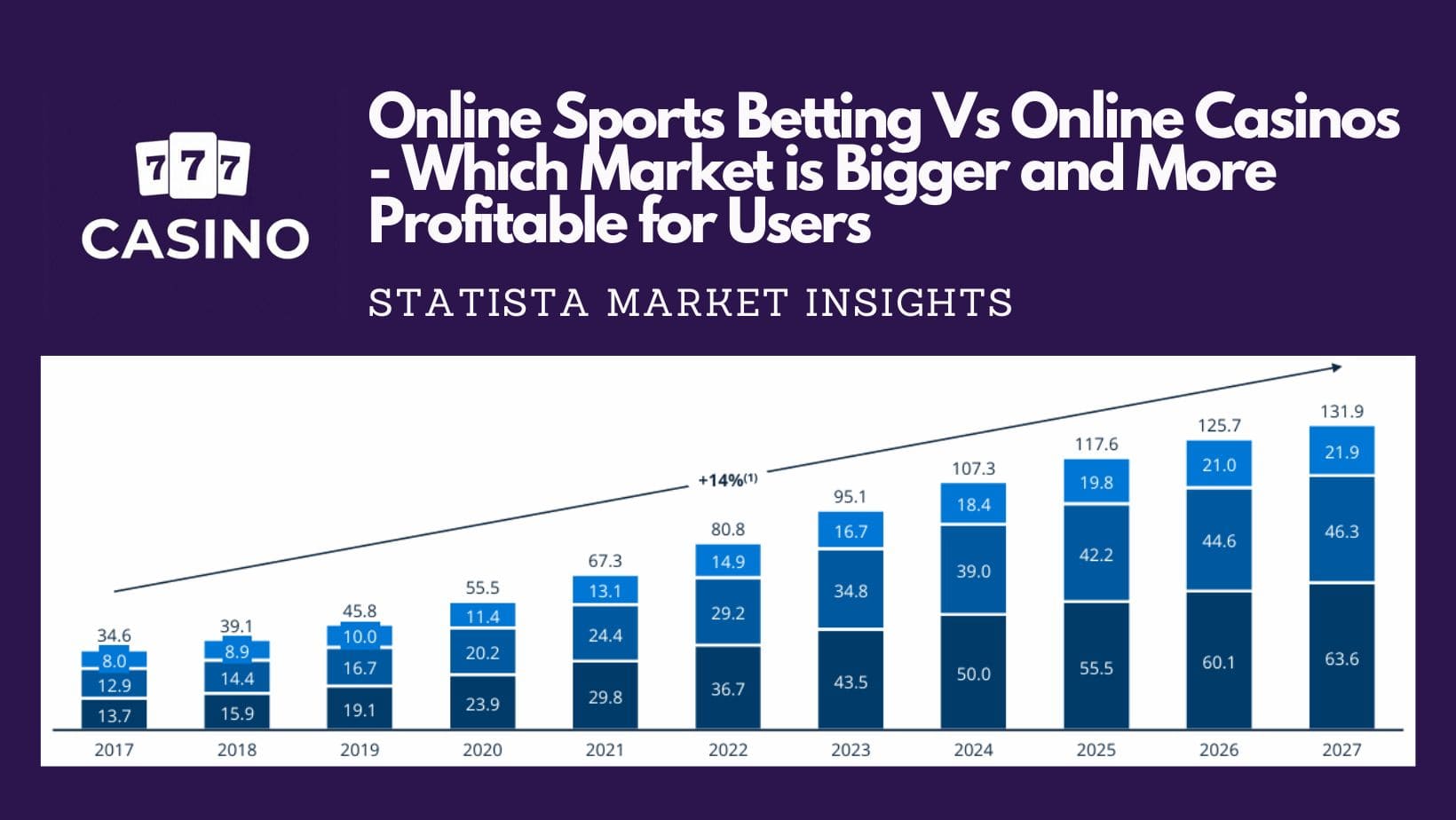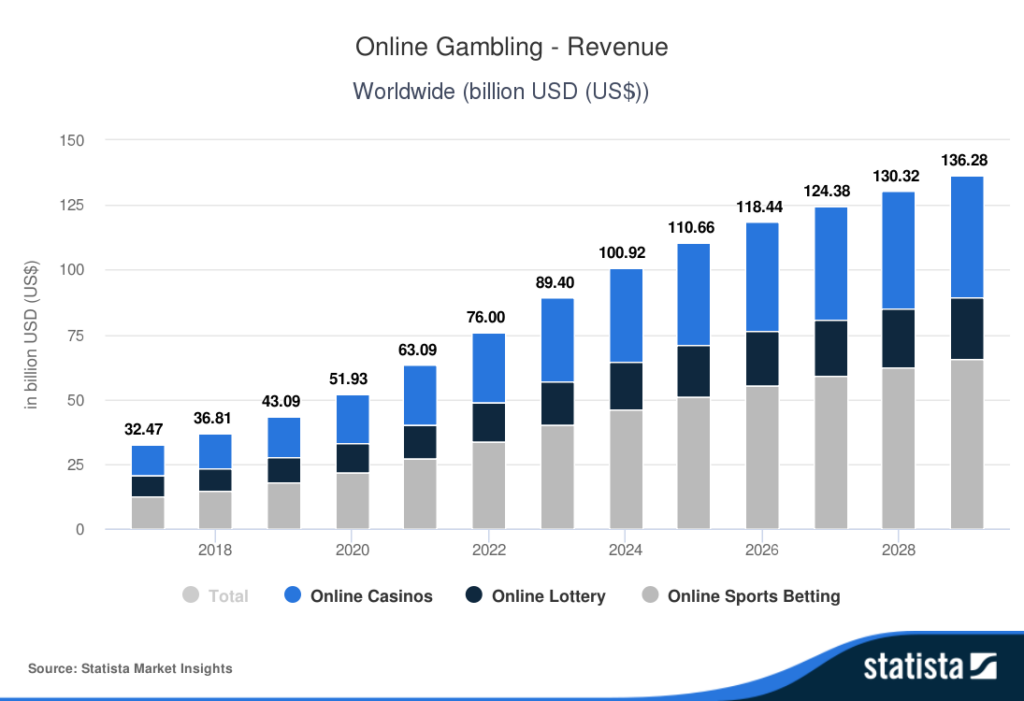Online Sports Betting Vs Online Casinos – Which Market is Bigger and More Profitable for Users

Gambling is a long-standing tradition in human culture. For as long as humans have been coming together in groups, they’ve been wagering, either on games of chance or on the outcome of sports. To this day, sports betting and gambling remain a very popular and profitable industry.
Because of the similarities between online sportsbooks and online casinos, many people tend to confuse the two industries. Indeed, a lot of people believe that they are the same. However, not all punters like to gamble, and not all gamblers like sports. In this article, we would like to look at the differences between sports betting and casinos, and how they differ.
Similarities
Before we talk about the differences between online sports betting and online casinos, it would benefit us to talk about the similarities between the two. Starting with the most obvious one; both often share a common website. There are plenty of online casino sites that double as sportsbooks, and vice versa. There is also the fact that a lot of online sportsbooks have online casino sister sites.
Another obvious similarity is that both online sportsbooks and online casinos tend to offer some pretty hefty bonuses. If you take a look at the numerous promotions for betting sites and casinos, you might notice that they are quite similar in many ways. Popular bonus options include things like Match Deposit, No Deposit, First Deposit, and Free Bets/Spins.
These are the biggest similarities that most gamblers will be familiar with. However, the main focus of our article is the differences between the two industries, especially regarding the financial aspect. So, let us move on to the main point, and talk about the differences between online casinos and their sports betting counterparts.
Which Market is Bigger?
The one thing that most people are interested in is which market is bigger. A lot of people may assume that online sports betting is a lot bigger. After all, sports are a key component of our culture. Football alone has 3 billion fans worldwide. Not to mention cricket (with 2 billion), basketball (with just over 2 billion), and boxing (with hundreds of million).

However, according to the latest projections and statistics, online gambling is quite a bit more profitable than its sports betting counterpart. For example, in 2024 alone, the online gambling market is expected to reach upwards of US$100 billion. If we were to look at the sports betting statistics, we would see that they are quite impressive, but not even half as much.
In terms of user penetration, the projected percentage of users who are planning to place a wager on a casino game in 2024 has reached around 6%. By 2029, that percentage is expected to reach around 7.6%. Compared to the 3.9% user penetration of sports betting, online casinos seem to be quite a bit ahead. So, it seems that the online gambling market is quite a bit bigger.
But, what most fans care about is not the businesses’ success, but rather the success rate of the consumers. And that is what we are trying to get to the bottom of. So, which business produces more revenue per user? That is what we are trying to figure out in this article.
Which is More Profitable?
The average revenue per user (APRU) of the sports betting industry is expected to reach about US$0.33k. Compared to online gambling’s APRU of US$0.47k, one could easily conclude that online casinos are more profitable, on average. However, that is a difficult assessment to make just based on these numbers.
After all, we have to remember that a lot more money goes into online casinos than into online sports betting. If we were to account for the difference in revenue spent on gambling and sports betting, then we might conclude that sports betting is just a bit more profitable for users. This makes sense, as a lot of sports fans use bet calculators as an aid when placing wagers.
Having discussed profitability and revenue generation, we are only left with one question; which countries are expected to have the most profitable gambling and sports betting industries online? Let’s find out.
Countries Where Both Industries Are a Success
Online sports betting is a global industry, with an incredible success rate. The market is legal across Europe, Africa, South America, and North America. However, according to the statistical analyses, it is going to be most successful in Australia. According to the latest stats, by the end of 2024, Australian bookies should produce over US$9 billion.
However, Australia’s success is measured in most revenue generated in 2024. If we were to focus on user penetration, then the most successful industry is undoubtedly in Canada. With Ontario having recently legalized online sports betting and online casinos, the Canadian iGaming industry is booming, and this is just another example of its growth.
On the other hand, online gambling is going to see the most success in the United States. The USA’s gambling laws are quite strange, as they vary from state to state. For the most part, states in the US have made it illegal to operate online gambling businesses, but it is still legal for residents to wager at offshore casinos. However, there are six states where iGaming is legal in all its forms:
- New Jersey
- Pennsylvania
- Michigan,
- West Virginia
- Delaware
- Connecticut
As for user penetration, Canada is once again at the top of the list. With a projected rate of 69.4%, the Great White North is expected to see quite a boom in wagers placed at online casinos. Again, this might be attributed to the recent laws passed in Ontario, which make gambling in the province legal.
Some Last Words
As far as which is more enjoyable, we can’t give a definitive answer. Different people enjoy different things. To fans of sports, wagering on their favourite team in their preferred discipline will undoubtedly be a lot more fun. On the other hand, gamers and statisticians may enjoy challenging themselves with games of luck like slots, games of skill like poker, and games that have a bit of both, like blackjack.

